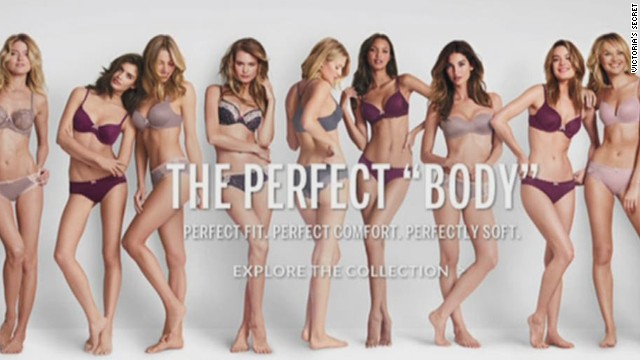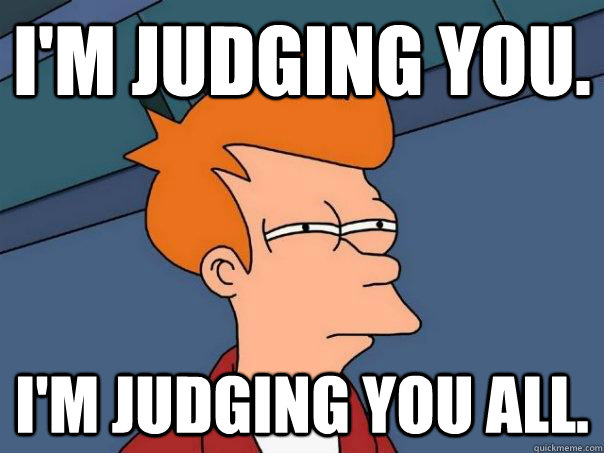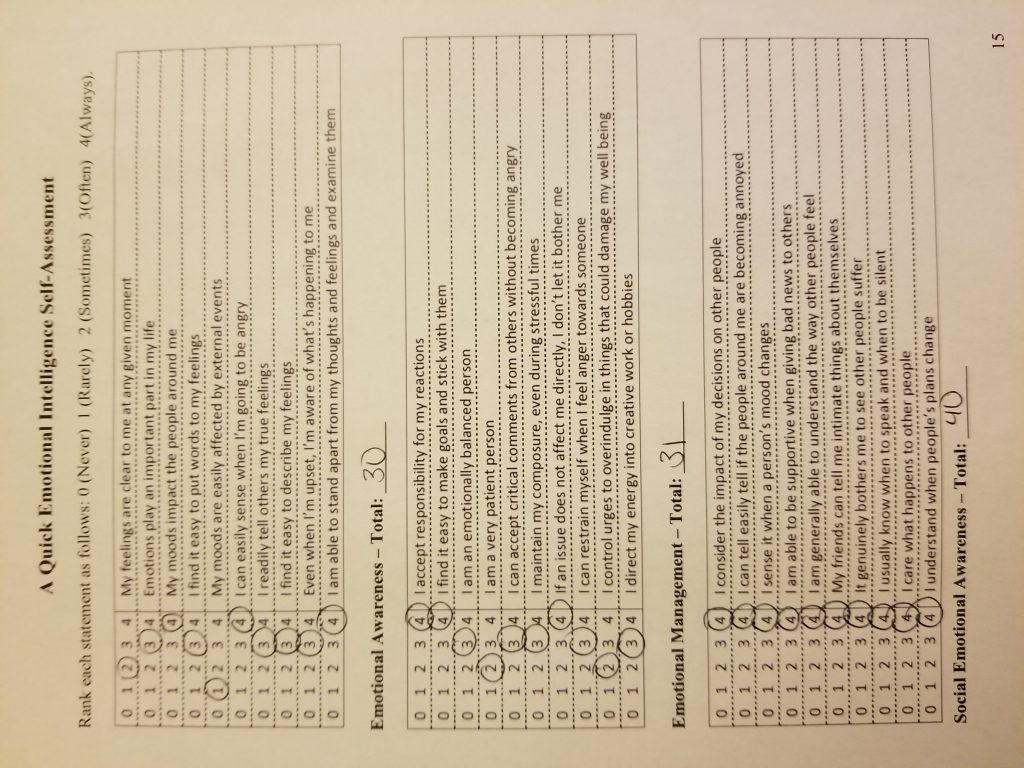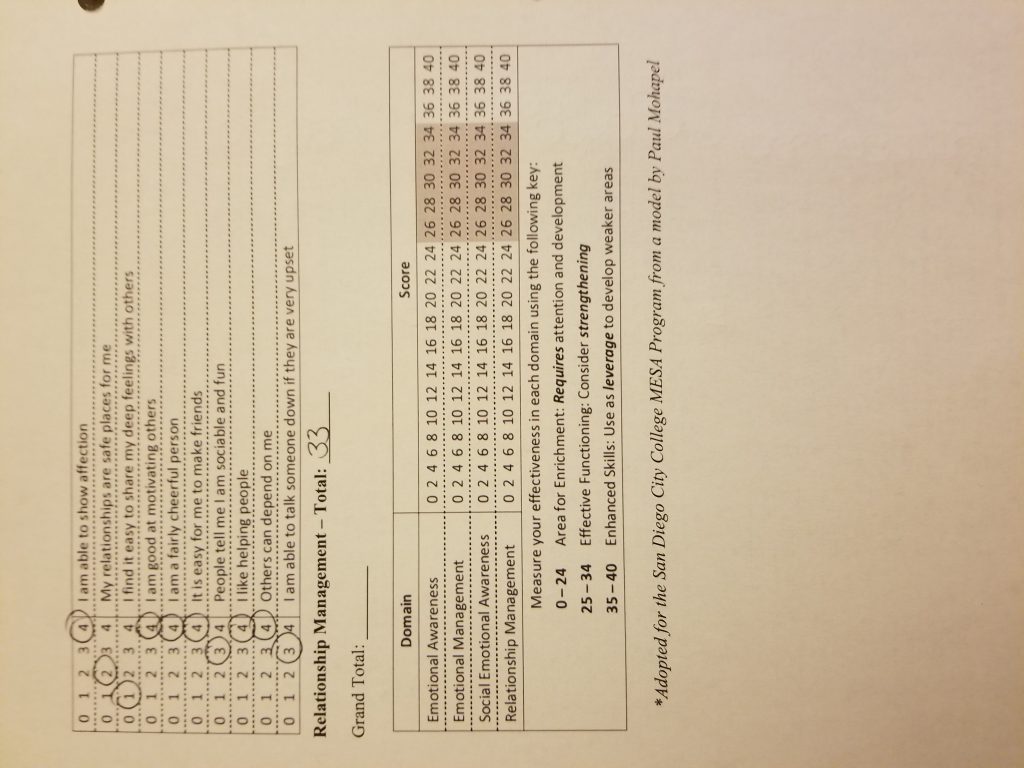Weekly Blog
Blog 10 – Course Reflection
As this course comes to a close I can honestly say that I’ve accomplished the expectations I initially had for myself and so much more. I wanted to learn how attitudes are formed and changed – to which I did. I wanted to learn just how people perceive and understand others and I gained some great insight into that as well. Lastly, I wanted to see how attitudes relate to behavior and I’ve gained an abundance of knowledge on this topic in relation to relationships, prejudice, helping others, and love. As I previously stated in my first blog, I like to fully understand a topic until I feel confident enough to teach it to someone else and that’s how I feel about all the goals I originally outlined.
Actually, I’ve already started spreading what I’ve learned to others, especially concerning stereotyping. I currently work on an inpatient psych unit at the hospital and since I’m quite new to the psych field I guess you can say I see things through “rose colored glasses” compared to my colleagues who’ve been in the field for years. I’ll find them unknowingly stereotyping patients. But due to this class I find myself constantly questioning my thought patterns to prevent myself from forming false views and to challenge the ones I currently may have. I even challenge the views of my coworkers using the prejudice reduction tips given in chapter 6 like recategorization. I see how biases affect patient care and I don’t want to fall victim to that.
When starting this course I wasn’t aware of all the things that encompasses social psychology. Social psychology covers nearly every aspect of life! It’s more than the study of behavior in social settings but it involves feelings, thoughts, processes, and actions. It’s not just individuals but groups, families, companies, races, and genders. It’s a lot more broad than I originally thought and by taking this course I have a greater appreciation for the work of social psychologists. As a person who loves studying human behavior and understanding why we behave the way that we do, this class fed the inner nerd in me. For instance, it pieced together the information that I’m learning about in my human cognition course, concerning the formation of thoughts and memories, and showed just how these very thoughts impact how we behave towards others and vice versa. Behavior influences cognition and cognition influences behavior.
In my second blog I wrote about how procrastination keeps me from being an excellent student and after writing that blog I really wanted to tackle that issue. Over the course of the semester I set up benchmarks for myself to turn in assignments early, read the requirements and writing prompts of the next week’s assignments a week in advance, reread and outline chapters the weekend before tests, and divided my writing sessions down for papers into different days instead of trying to knock it out in one setting. To my surprise all of this worked! As a result, I’m doing great academically and I no longer find myself feeling overwhelmed or stressed out over assignment due dates or even tests. By splitting my assignments up I decreased the occurrence of burnout and overcame my writers block that I usually get when trying to crunch out last minute papers. By identifying the problem (my procrastination), setting small goals to overcome it, and holding my self accountable to perform each task, I changed how I viewed it. I no longer saw it as this monstrous task, too big to tackle. Instead I saw it for what it was, a simple problem that can be solved with simple solutions.
Even so, I would tweak one thing if I could retake this class and that would be to divide the submission due dates up and move my personal submission due dates up to three days prior to the actual class due date. I currently have them set at two days prior to the actual due date but I found this to conflict with my other classes and left me with multiple assignments due on the same day, sometimes around six or seven. But if I divided the assignments up into individual days, even with all my other class assignments, I would have no more than four assignments due on any particular day which keeps my stress level down.

Blog 9 – Making Connections
Over the course of this semester I’ve learned about relationships, love, and prejudice and this ePortfolio has challenged me to dive deeper and think outside the box concerning each of these topics. For instance, we’re social being with an ingrained need to affiliate. It’s a basic trait etched in our genes that, presumably, led to our survival. But this trait can leave us with feelings of sadness or hurt if its need is not met. As the previous blog suggests, this may be the same case with another set of genes associated with sexual reproduction. The sexual conflicts that arise in relationships due to evolution may also be acting on us. Prior to reading the article I had no prior awareness of the role these genes may have on our behavior but this exercise forced me to abandon everything I thought I knew about dating and see things from another perspective. The same things responsible for our survival may be the same things that lead to our unhappiness.
The next eye-opening topic discussed in the course was love. Initially, when I thought about love I considered it to be singular, one dimensional but the love styles assignment showed me that it’s multidimensional and has the ability to change. The type of lover we are changes from partner to partner and as time goes on. According to Sternberg’s Triangular Model of Love, a combination of intimacy, passion, and commitment make up the ideal form of love and from the love styles questionnaire I can see I have a ways to go to accomplish that form of love. Lastly, another one of the things I’ve learned in this course is the art of persuasion as examined in the blog post on communicator credibility and attractiveness. Credible sources are successful in changing the attitudes of others as well as attractive communicators by way of heuristic processing. The fitness guru I chose for my blog exercise is seen as credible because she’s deemed an expert in fitness and people feel that they can trust experts. As a result, what she recommends and says is trusted without any deep processing of the information given. This exercise tied everything from the book together and made it clear on how persuasion works.
A common theme across two of the ePortfolio sections is prejudice. People hold prejudicial views about both races, as argued in the assignment, and women, as seen in the portrayal of them in ads. It’s a lot easier to see prejudice reflected against races but it’s also present in how some see women. Blacks are seen as inferior but women are seen as sexual objects purely for the enjoyment of men, both of which increases the occurrence of violence against these groups. As I’ve learned, the root of both of these views are implicit thoughts that surface when a white man’s ego feels threatened or during a market strategy meeting for a product. Prejudice can be either blatant or subtle but it’s still there and, unbeknownst to some, present in our everyday lives.
Evolutionary psychology as described in social psychology suggests that some of our social behavior is passed down which places us at a predisposition to act in a certain manner. It influences our mating preference, aggression, and how and why we help others. On the other hand, evolution in abnormal psychology suggests that the genes we inherited from our ancestors that helped them to survive may be the same genes that make us prone to developing mental disorders like anxiety. It’s interesting to see how one concept can be used to explain behavior across two different disciplines.
Blog 8 – Mating
I find sexual conflict to be quite intriguing. To suggest that spousal relationship conflicts may be due to a conflict between the genes in males and females is wild, but not far fetched. Until reading this article I wasn’t aware of the link between the two. Our entire existence is primarily for gene survival and reproduction of these genes so it’s not crazy to think that these genes impact our behavior. As the article stated, men casts their net far and wide to increase their chances of offspring whereas women tend to want a man who is a provider and will help take care of her and her offspring. Each is a way to promote greater gene survival and as these genes survive so does the genes that allowed for their reproduction, such as the ones that contribute to the behavior aforementioned. This makes sense as to why men and women clash over the things they do while in a relationship. Both sexes agree that infidelity causes hurt, anger, and upset feelings. For men this may be because infidelity poses as a threat to his chances of having an offspring. The woman may leave him for the other man or become pregnant by the other person. Both of which limit his chances of passing down his genes.
As for women, infidelity can leave a woman without a provider or a partner to help sexual reproduce her genes. Men upset women by lying but lying can be beneficial in terms of securing a man with offspring. It may allow him to commit or stay committed with a female he prefers which improves his chances of gene survival. Women upset men by nagging but nagging can be beneficial to women by ensuring that they pick the best mate for reproduction. If they continuously have to nag at their partner then that may be evidence that their partner might not make a good person to take care of their offspring. This was quite eye opening for me!

Blog 7 – Self-Regulation & Emotional Intelligence
Emotional intelligence is our ability to perceive, understand, and regulate our own emotions/feelings and then use this knowledge to govern ourselves within the different relationships and situations we find ourselves in. As a life coach, I break it down into 4 parts which are perceiving, using, understanding, and managing emotions. The first step is to perceive emotions accurately, not just words but body language as well. The second step is using our emotions to help us prioritize what we do and do not pay attention to. Third, it’s important to understand the emotions that we perceive and what may be the cause of them. Lastly, there’s managing or regulating emotions so that we respond appropriately to the emotions of others and situations we’re in.
To have high emotional intelligence it’s crucial to be able to effectively regulate your own emotions so that you can respond in a manner that’s best fitting for the situation and will not cause further tension. For example, I interact with patients suffering from anxiety, depression, bipolar, and schizoaffective disorders at the behavioral health unit I work at. Something as small as a friend not picking up their phone call when they call can cause them to become disgruntled and upset. By exercising emotional intelligence, I know that they are only upset because their inability to reach their friend and is not caused by something I personally did. Knowing this has allowed me to offer kindness instead of retaliating with anger or aggression. I’m learning to not take everything personally but this is something I work on every day to try and get better at. I practice deep breathing when I’m flooded with emotions and I try to pay close attention to any negative thoughts I may have, as mentioned in the video.
I scored within the gray box meaning I need to work on most of my skills.
Blog 6 – Women in Ads
I found the TEDx given by Jean Kilbourne to be quite profound. Everything she stated during the presentation doesn’t get as much attention as it should. She touched on some key issues like the differences between how men and women are portrayed in the media such as insulting women’s body parts to manipulate them into buying products. I’ve always been aware of some of the marketing tactics used towards women, especially women of color, but I wasn’t aware of the stereotypical ways they market men. I’ve always known that ads portray women as young, beautiful, sexy, and perfect but I wasn’t aware of the ramifications of doing so. In return for ads objectifying women, men begin to see them as objects and not as human beings placing them at a greater risk for violence and danger. This not only applies to men but boys as well. Boys are encouraged to be tough and invulnerable and to view women as sex objects, an idea that stays with them as they grow older.

This perfume ad by Dior illustrates the pressure for women to be perfect, young, and beautiful.

This ad shows how men are shown in a stereotypically, masculine way. The ad is defining what it means to be a man essentially – having muscles and partaking in a dangerous activity.

An ad like this by Victoria secret shows that thinness is the definition of the perfect body. As VS is a well-known lingerie store it hints that sexy means thin.

This perfume ad by Sean Jean shows a woman being submissive at the hands of a man. It showcases one of the alarming issues concerning women being portrayed as objects for men to do as they please.

Yet another ad that objectifies a woman as a sex object as a reward to a man for simply cleaning himself in this ad.

Blog 5 – Communicator Credibility and Attractiveness

This ad by personal fitness trainer and health and wellness coach, Jillian Michaels, is perceived as credible due to her profession and prior experience with obesity as an adolescent. Coupled with her regular appearances on NBC’s The Biggest Loser, in which she helped a team of overweight individuals lose weight, launched her career as a knowledgeable, trustworthy fitness expert. Since then she has written many books on the topic and has released workout and health programs aimed at helping individuals lose unwanted weight and keep it off.

This political ad by former Michigan Governor Rick Snyder for his re-election campaign is not a credible source due to the aftermath of the water crisis in Flint, Michigan that resulted from his negligent actions. His slogan “Moving Michigan Forward” is a contradiction to his previous actions that set hundreds of citizens back and exposed many to lead poison. As a result, he is no longer viewed as trustworthy and has lost all credibility.

This ad for beats headphones is an example of the use of attractiveness in ads because the person in the ad is a well-known and liked athlete that appeals to this brand’s target demographic. Lebron James is a top athlete, philanthropist, father, and just a cool guy who everyone either wants to be or be with – the guys want to be him and the girls want to be with him. The latter is exactly what this ad successfully portrays and why its marketing strategy is quite effective. The ad is appealing to consumers who want to be just like Lebron James. Lebron is a powerful person on and off the field and the ad suggests that if others want to be just as powerful they’ll need some powerful headphones, for example, these powerbeats by dr.dre. Powerful headphones that deliver powerful sound can make consumers feel powerful too, just like Lebron James.

Ads that are (from left to right) credible, not credible, and attractive.
Blog 3 – Music and Relationships
There is definitely a connection between music taste and compatibility. As the article stated, a person’s taste in music can tell you a lot about them and what they value. I listen to music that speaks to me and as a result my taste has changed over time. The music I liked when I was younger no longer speaks to me and there are new genres of music that do. I like to believe that this is the case for everyone too. I’ve noticed this music connection evident in the bond of the guys I’ve dated in the past. I tend to have stronger bonds and deeper connections with guys I share similar tastes in music with compared to guys I don’t. The type of music the guys I connected with on a deeper level sort of matched up with my ideals on love, life, social issues, and relationships. For example, me and the guy I’m currently dating share a love for many of the same songs and genres like indie soul, R&B, and the blues. We have a strong bond and share many of the same values such as compassion, honesty, loyalty, fun, peace, respect, and spirituality. Whereas my ex and I didn’t even have one song in common that we liked and one of the reasons for our breakup was that we didn’t value the same things. If only I knew then what I know now.
The Soundtrack to My Life
Exhale (Shoop Shoop) – Whitney Houston – This song reminds me of my bestfriends Kacy and Curtese because it speaks about how life can get hard but we can make it through the hard times with the help of friends.
Maybach Music – Rick Ross – This one is for my sister. It’s both of our favorite songs and just speaks to our love of long, peaceful car rides while blasting music with no worries at all.
sobeautiful – Musiq Soulchild – Although this song is about his love for his partner, I’ve kind of spun it around to stand for the love I have for myself. It’s my ultimate self-love song.
You – Jesse Powell – From the lyrics to the memory attached to it, this song represents my significant other and the connection we have.
Cassius (Excellency) – Wale – Wale does an excellent job at capturing the love I have for my race and the outlook I have on life concerning my race.
September – Earth, Wind & Fire – This song brings me back to my childhood when my mom would crank up the grill and blast this song on repeat singing at the top of her lungs.

Blog 2 – What Type of Student Am I?
I would say I’m a very bright student when I apply myself. I take pride in “knowing my stuff” so I go over material until I feel like I can teach someone else about it with confidence. Quite honestly, my biggest, and only problems at the moment, is my procrastination and I have a bad case of the planning fallacy – the tendency to underestimate the amount of time it takes to complete tasks. Although I’m very organized and I stay on top of when assignments are due, oftentimes I wait until the last minute to complete assignments and don’t allocate the appropriate amount of time it takes to complete it leading me to miss the deadline or be penalized for turning in the assignment late. But on those good days when I’m able to submit my work on time or early, I do very well and receive great remarks from my professors. I think this is what contributes to my above average level of confidence as a student because I know I’m capable of producing phenomenal work if I didn’t sabotage myself so much. All I need to do is work on my time management skills and just do the work and my confidence level would be through the roof. But it’s knowing that even if I wait until the last minute to do stuff I still get the assignment done and my work is not half bad. This is what leads me to procrastinate every time and is evident with my self-efficacy results. I scored very high because when it comes to completing my tasks, even when I procrastinate, I get the job done and I’m confident in this aspect. When I’m faced with a challenging assignment or I’m unsure about something I’m confident in my problem solving abilities to remain calm and get the job done in spite of the pressure.

My student life summed up in one word – procrastination. I may be a bright, intelligent student but I always love a good challenge.
Blog 1 – Expectations
I must say I am super excited to take this course after reading the first few chapters. I think it’ll give me some great insight for treating some of the disorders I’m interested in treating such as anxiety and depression. In this class we’ll discuss how attitudes are formed and changed and how these attitudes relate to our behavior, as well as the processes through which people perceive and attempt to understand others. These are very important concepts and processes for me to understand if I hope to help others change or cope with behaviors causing them distress. If I gain a better understanding of how attitudes are formed and changed then I will have a better understanding of what led my clients to behave as they do and how I can best help them change their dysfunctional attitudes. It’s imperative for me to understand this as social settings, social perception, and relationships can all contribute to anxiety and depression in individuals.
I currently work as a mental health tech at an inpatient psych unit at one of the hospitals so I’ve had the opportunity of seeing and interacting with patients suffering from multiple disorders. By taking this course I’m hoping it’ll tie it all together – my work experiences and previous classwork – and give me a better understanding of the disorders I witness on a daily basis at work. On another note, I can see this class being useful to me in my personal life. I had to stop and analyze my own behavior and thoughts a few times while going over the material for this class. For instance, chapter 2 discussed how we think about the world using things such as schemas and prototypes. It made me take a look at myself and some of the irrational conclusions I’ve drawn about people. So I’m looking forward to finding out more false narratives I’ve painted about myself and others and maybe fixing them if need be.
This course does appear to go over a lot of content which causes some concern that I’ll end up overlooking something as I can have tunnel vision at times. I like to focus on one thing until I feel that I’ve mastered or fully understood the information but with a class such as this one I’m worried I may spend too much time learning one thing and end up neglecting other important topics and next thing I know I’m behind in the class. But I have a plan, I’ve set reminders in my phone and outlined all my assignments on my calendar to prevent this from happening. I plan on starting and turning in assignments early and I’ve also told myself to not be afraid to reach out for help when something doesn’t click so I don’t end up spending too much time “mastering” one thing. Online classes can be a lot of work. They require discipline, organization, and lots of time. So there is no room for procrastination.

I’m Judging You All
In an effort to understand the world around us we make inferences and judge others. Sometimes automatically, other times carefully, and many times quickly.


